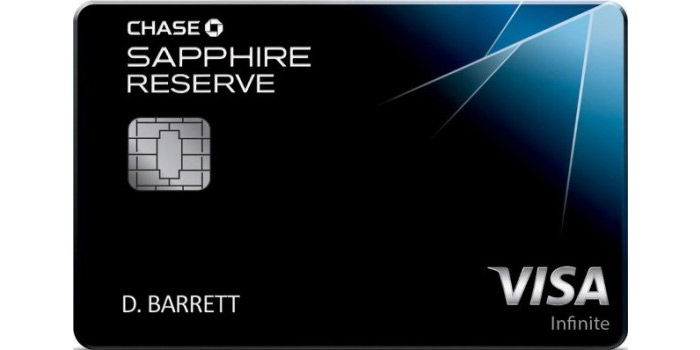The Chase Sapphire Reserve is one of the most popular travel rewards credit cards, known for its generous perks. Cardholders enjoy a $300 annual travel credit, triple points on travel and dining, and premium benefits like airport lounge access and travel insurance.
Since this is a premium credit card, qualifying can be competitive. Your credit score plays a major role in approval, but other financial factors also influence your chances. Knowing what Chase looks for and strengthening your credit profile can improve your odds.

Credit Score Requirements for the Chase Sapphire Reserve
To qualify for the Chase Sapphire Reserve, a credit score in the mid-700s or higher is typically recommended. Some applicants may be approved with a score in the upper 600s, but stronger credit profiles generally receive better terms.
Chase evaluates more than just your credit score. They also review your credit history, income, and existing relationship with the bank. Additionally, their 5/24 rule applies, meaning if you’ve opened five or more credit cards across any issuer in the past 24 months, your application may be denied.
Strategies to Increase Your Chances of Approval
- Know your credit scores and reports: Before applying for any credit card, it’s essential to be aware of your credit scores and what’s on your credit reports. You can request a free copy of your credit report from each of the three major credit bureaus (Equifax, Experian, and TransUnion) once per year at AnnualCreditReport.com.
- Maintain a strong credit history: Credit card issuers want to see a solid credit history, which includes consistent on-time payments, a mix of credit types, and a long credit history. These factors demonstrate your reliability as a borrower and increase your chances of approval.
- Keep a low credit utilization ratio: Your credit utilization ratio is the percentage of your available credit that you’re currently using. Lenders prefer a low credit utilization ratio, typically below 30%, as it indicates that you’re managing your credit responsibly and not overextending yourself. To maintain a low credit utilization ratio, try to pay off your balances in full each month, request a credit limit increase, or avoid closing old credit card accounts with available credit.
- Limit recent credit inquiries: Applying for too many credit cards or loans within a short period can lead to multiple hard inquiries on your credit report, which can lower your credit score and signal to lenders that you may be a higher risk borrower. To increase your chances of approval, it’s best to space out your credit applications and only apply for credit when necessary.
- Verify your income: A steady income is another factor that credit card issuers consider when evaluating your application. Ensure that you can provide proof of income, such as pay stubs or tax returns, to demonstrate your ability to repay the credit extended to you.
Strengthening Your Credit for Approval
If your credit score isn’t quite where it needs to be, there are ways to improve it before applying. Paying down balances, maintaining a history of on-time payments, and reducing recent credit inquiries can help strengthen your credit profile.
For those needing more guidance, credit repair services may be an option. Credit Saint helps clients dispute and potentially remove inaccurate negative items from their credit reports, such as late payments, collections, and charge-offs.
If you’re working toward qualifying for the Chase Sapphire Reserve, visit their website for a free credit consultation.
How many credit card accounts can I have open?
When applying for new credit cards, especially with Chase, you need to be aware of the 5/24 rule. This rule means that if you have opened five or more personal credit card accounts across all banks within the past 24 months, Chase is likely to deny your application.
It’s important to manage the number of new accounts you open not just for compliance with this rule, but also to maintain a healthy credit score. Multiple new accounts can signal risk to lenders and may temporarily reduce your credit score due to hard inquiries and lower average account age.
What to Do if You Get Rejected
If your application for the Chase Sapphire Reserve is denied, the first step is to understand why. Chase is required to provide an explanation for their decision, which can help you identify what areas of your credit or financial profile need improvement. You can then call Chase’s reconsideration line; this gives you a chance to speak directly with a representative about your application.
During this call, be prepared to discuss your credit history, income, and financial situation. Explain any circumstances that might have led to the denial and how you’ve addressed them. It’s also helpful to mention any positive changes to your financial situation or corrections to your credit report that may not have been considered initially. Persistence and a clear understanding of your credit profile can sometimes turn a rejection into an approval.
Bottom Line
Securing the Chase Sapphire Reserve card requires a strong credit score, typically in the mid-700s, along with a solid financial history. Familiarize yourself with Chase’s 5/24 rule and manage your credit accounts wisely to maintain eligibility.
If your application is initially rejected, don’t be discouraged. Understand the reasons for your rejection, utilize the reconsideration process, and take proactive steps to improve your financial standing. By enhancing your credit score and fine-tuning your credit management strategies, you increase your chances of gaining approval and benefiting from the extensive rewards and benefits that the Chase Sapphire Reserve offers.



